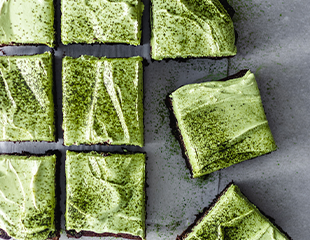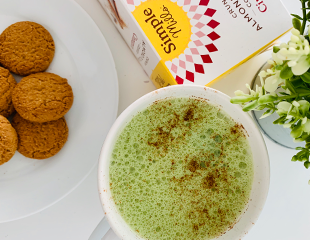Tap into matcha when you need your next caffeine fix. We asked Registered Dietitian, Olivia Wagner (MS, RDN, LDN, IFNCP) to talk all things matcha, including its background, health benefits and preparation. And no, we aren’t just looking for an excuse to make these Mint Matcha Brownies.

Matcha’s Background
Matcha and green tea start as the same plant, but differ in how they are grown and manufactured. With the end goal of the ceremonial Japanese matcha green tea, the plant is grown in the shade before being picked and dried, increasing the amount of chlorophyll in the tea leaves, as well as beneficial compounds like antioxidants and amino acids. It is then classified as “tencha,” which is trimmed and removed of veins before being ground into what we know as matcha powder. Matcha is the only tea where the leaves are consumed as part of the drink, rather than being infused in hot water. Therefore, the antioxidant content is higher than other teas.
Matcha Health Benefits
Relaxed Alertness - One of the most abundant amino acids found in matcha is called l-theanine. Research shows that both l-theanine alone and paired with caffeine (also naturally found in matcha tea) can induce a state of relaxed alertness. The l-theanine in the tea can help to combat caffeine-induced anxiety and some the “crash like” symptoms that can occur with caffeine consumption.
Anticancer Properties - Matcha tea contains a large content of polyphenols that increase the antioxidant properties of the drink. Polyphenols have strong anticancer properties.
Mood and Cognitive Performance - The health benefits of matcha tea also arise from the antioxidants it contains, primarily flavonoids. These are also known as catechins, like epigallocatechin gallate (EGCG), that in research repeatedly demonstrate benefits on mood and cognitive performance. The concentration of EGCG can be a lot higher in matcha than in regular green tea.
Liver Health - One of the most impressive matcha benefits is its effect on liver health, including its ability to promote liver function and protect against disease. The antioxidant, antiviral and anti-inflammatory functions stimulate immunological and detoxification processes, so the consumption of green tea is associated with a reduced risk of circulatory system illnesses and cancers.
Preparation & Use
Adding a serving or two of organic matcha to your daily routine can give your body a boost of antioxidants (i.e. phenolic acids, catechins, and flavonoids). The classic preparation involves simply sifting 1-2 tablespoons into a cup and then combining with about 2 ounces of hot water. You then use a bamboo whisk to mix the two together until the tea becomes frothy. P.S. matcha pairs perfectly with our Cinnamon Crunchy Cookies and is a wonderful morning boost when baked into the Almond Flour Waffle and Pancake Mix.
Simple Tip: Matcha still does contain caffeine and can trigger side effects in some people. Being mindful of symptoms of high amounts of caffeine like anxiety, hyperactivity, fidgeting, and insomnia is important.
